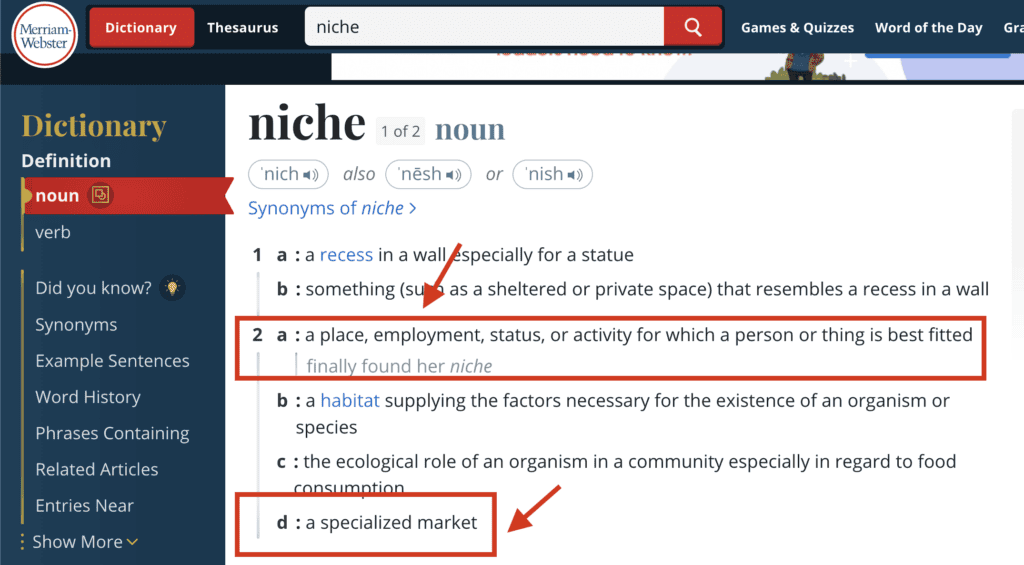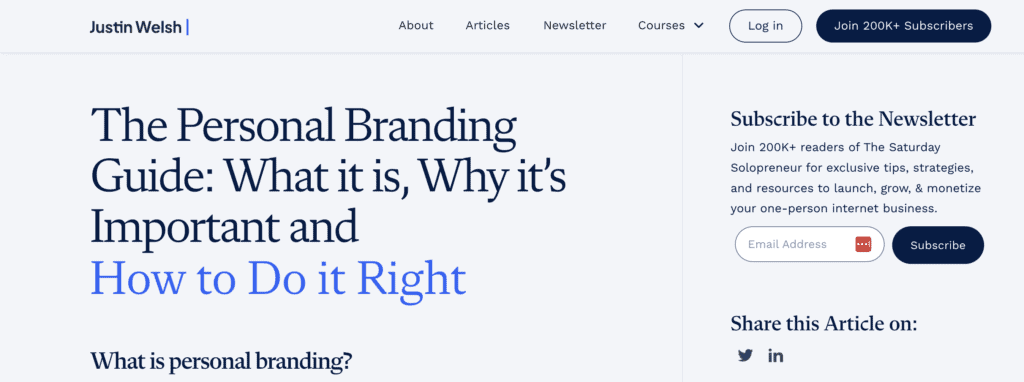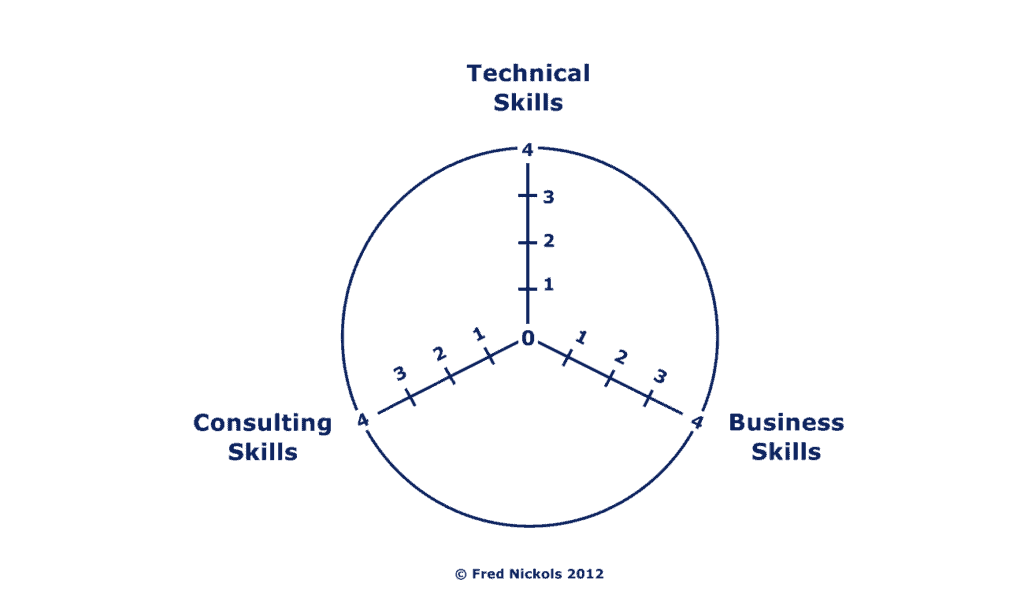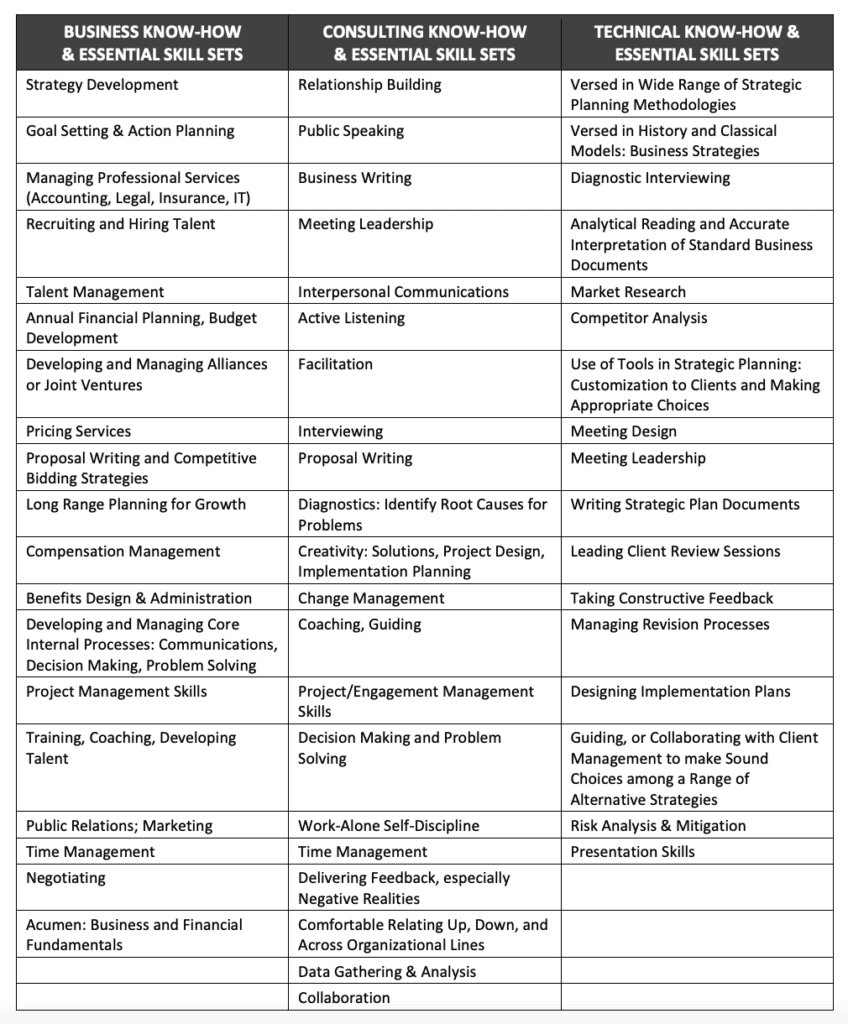Hello there. You might have googled something along the lines of “small business consulting” to get here. Or found us some other way. However it is you landed on this page, welcome! With any luck, we’ll help you get closer to what you were looking for in the first place.
If you’re thinking about getting into small business consulting, getting from 0 to 1 is usually the hardest part. Where do you start? What do you market? How do you know you even have value to add to a certain market?
All fair questions. In fact, when these questions come up don’t think of them as negative. These are the types of questions we have to answer in order to become super clear on how we’ll take our chunk of the consulting market by storm.
Here are 8 common questions to ask – and think through – as you consider launching your small business consulting hustle.
Question 1: What’s my Small Business Consulting niche?
First things first, you need to get honest about what you want to do and where you want to do it. The good news is that no matter where you’re coming from, you can always make a name for yourself in a niche. The base news is that means you can choose anything! Which makes the whole choosing a niche thing overwhelming.
You can always change it, too. There’s no niche police that make you specialize in one thing once you’ve made your mind up. So, don’t put TOO much pressure on this decision. Just take it one step at a time.
First step – let’s define this whole niche thing. For that, to Merriam-Webster we go.

For the sake of this article, and our purposes as consultants, let’s focus on the 2 highlighted above.
“A place, employment, status, or activity for which a person or thing is best fitted”. Another way to think about it is, “A specialized market”.
So, now the question evolves from, “What’s my niche?” to more focused questions. Questions like, “Where would I be best fitted?” or “What’s a specific market I want to be involved with?”
When getting more clear on your initial niche. Here’s a few ideas to help you work through the decision.
Reflect on Past Projects: Look back at your previous work. What did you excel at, and what got you fired up? Which industries really piqued your interest? Those passion projects often point to your niche.
Experience Assessment: How long have you been in certain industries? Have you spent most of your career in, let’s say, finance or insurance? Or have you been more of a journeyman? Might make sense to stay in an industry you know really well to leverage your existing network and showcase the wins you’ve already had.
Market Research: See what’s in demand. If businesses are crying out for support services a certain service that you’re good at, bingo, you’ve found your niche!
Identify Your Interests: This is often overlooked but crucial. Identify what you value most in your work and outside of it. I find it really cool to know that you can use this business to bridge the gap between the two. Love investing, but have never worked in finance before? Now you can!
Remember, finding your niche is important…but it happens more naturally than one might thing. So don’t rush, take your time, and enjoy the discovery process. You’ve got this!
Question 2: What’s my Brand Identity?
If you’ve taken some time to understand what you’d like to do and which industry you’d like to do it in…it might be time to create a persona around it. After all, when you’re a small business consultant you are the product!
So, think about this process as the first step to designing your professional consulting profile. Do you want to come across as the friendly neighborhood IT guy or the go-to expert for all things tech? Your brand identity will be the face you show to the world, so make sure it resonates with your target audience.
A personal brand isn’t just a fancy term for your favorite color scheme or a cool logo. Don’t think about branding here like they do at Apple or Nike. You don’t have things to sell…you have knowledge, transformation, and outcomes you can help achieve! You’re much more than a commodity.
Your personal brand ins’t just what you’re selling. It’s who you are, what you stand for, and the unique qualities that set you apart in the vast universe of professionals. It’s about letting your true personality shine through your work, your interactions, and even in your failures. It should be comfortable, natural. and reflective of your personality. People want to know about you. So, let them. How, you might ask? Well, it’s simple, but it’s not easy.
First, you’ve got to understand yourself. Remember the self-assessment and reflection you did in step one? That’s going to come in handy. Dig out your values, business goals, your strengths, your passions, and weave them into a coherent narrative.
Next, identify your unique selling proposition (USP) and start to build some topical authority around it. Create an offer people can sign up for, explain what excited you about this certain industry/niche/specialty. Make sure people know why it is you’re here and what makes you different from than anyone else.
Then, put it out there. Start networking, building relationships, and showcasing your work. Be consistent in your message and authentic in your interactions.
Remember, building a brand takes time. Keep at it, and don’t get discouraged. Keep going, keep growing, and soon, you’ll see your personal brand take shape. And trust me, it’s going to be awesome!
If you want to check out some more resources on Personal Branding, check out Justin Welsh’s site. He’s an amazing resource with a fantastic newsletter and tactical advice on how to start and grow your personal brand.

Question 3: What am i an expert in?
So, you’ve found the industry or niche you want to pursue. You’re working on that personal brand and gaining an audience. Now, you need to confront the question, “What makes me special?”. What is your expertise and how can you package it in a way that people will want to, more or less, purchase it from you?
Few things that can help you understand how, and what, you can market your services to the market. And make sure the market is one that has a demand for your skillset.
Certifications: Do you already have professional certifications? Gone through professional trainings? If so, these in and of themselves make you a rarity. So, don’t sleep on the amazing work you’ve already done. Realize you are an expert. And consider consulting on these topics.
Follow Industry Leaders and Influencers: Keep an eye on the big players in the tech field. What skills are they seeking in their job ads? What are industry influencers tweeting about or blogging about? What are the up and coming niches? This can give you a sneak peek into what skills are becoming hot on the market.
Check Out Job Boards: Job boards can be your crystal ball into the future. Regularly scan sites like Indeed, LinkedIn, or Glassdoor to see what employers you’d like to work with are asking for. Look for patterns and trends – if you see the same skills popping up again and again, it’s a safe bet they’re in demand. Do they align with yours? You’ve got yourself a prospect!
Online Learning Platforms: Check out the popular courses on platforms like Coursera or Udemy. These platforms often showcase courses in trending fields, so it’s a good indicator of what skills are gaining steam.
Tech Conferences and Webinars: These gatherings are where the magic business technology happens! They’re a great place to get the inside scoop on what’s next in tech. Plus, you can learn from the experts and network with others in your field.
Industry Reports and Surveys: Resources like the Stack Overflow Developer Survey or LinkedIn’s annual Jobs on the Rise report can reveal what skills are on the up and up.

Question 4: Do I have enough experience?
Short answer is, probably. Experience is too often measured in time – years, specifically. That doesn’t have to be the case. I know plenty of salespeople who, in 3 years, have sold more than people who have been in seat for 6 or 8 years. So, let’s throw the notion away that you need to have a certain amount of years of experience.
What do you need? To have proven examples of driving value around your service. When we’re thinking about our consulting business, let’s shift the question from “Do I have enough experience” to “Do I have enough case studies?”
Since your experience is likely enough, you should start working on ways to showcase it. Do you have references on LinkedIn? Perfect. You might be even closer than you originally thought.

If not, have no fear. This is a great opportunity for you to reach out and go get some. How?
You can message colleagues, previous bosses, current bosses, etc. and ask them to write a Recommendation on LinkedIn. Then, you could even offer to write it for them or make the request to have them mention your expertise in X or Y…whatever it is you want to showcase on your consulting business website.
If you need inspiration, The Muse gives some great examples in their article on How to Ask for LinkedIn Recommendations.
Question 5: How do I become Successful?
Fred Nickols and Harvey Bergholz wrote about the Consultant’s Competency Circle in 2012 and it’s still pretty relevant today. After spending 45 years in consulting, they came to the conclusion that the best consultants they worked with – or at least the ones they saw become successful – had prowess in the all the following areas: Technical skills, Consulting skills, Business skills.

To put it simply, consultants who are the most successful possess a high degree of competence in each of the domains above. Maybe it doesn’t always start out that way, but to be successful you have to work towards becoming an expert in each.
You might be thinking, what are consulting skills? Or business skills for that matter. Our good friends, the authors of the competency circle also did us another kindness. They created a table of skills you can start to build on your own. You can find the table on Fred Nickol’s website.

To be a successful consultant, you’ve got to work towards a balance. A balanced skillset made up of all 3 consulting competencies. Rome wasn’t built in a day, and neither will your business. So, don’t let the sheer number of skills make you apprehensive. You’ll be a wiz in no time.
Question 6: How would I get clients?
Ahh, yes. The biggest question of them all! How the heck am I going to get somebody to pay me for consulting services? It might not be as hard as you think. Here’s some advice we have for our readers.
Leverage Your Network: Don’t underestimate the power of the people you already know. Friends, family, former colleagues – they all have connections that might just need your consultancy services too. So, don’t be shy – let them know you’re open for business.
Social Media: In today’s digital age, social media platforms like LinkedIn, Twitter, and even Facebook can be gold mines for finding potential clients. Engage in relevant groups, share your expertise, and watch the opportunities roll in.
Freelance Platforms: Websites like Upwork, Freelancer, and Fiverr can be a great starting point. They allow you to connect with clients globally and can offer a steady stream of projects.
Local Businesses: Don’t forget about the businesses in your local area. Many local businesses need help and prefer to work with someone they can meet face-to-face. So, why not pop in, introduce yourself, and see if they need your help?
Industry Events: Industry conferences, workshops, or meetups are excellent places to network and meet potential clients. So get out there, shake some hands, and make your mark! Remember, you’ve got what it takes – now it’s time to put yourself out there and get noticed.

Here’s another thing. Your first client, or first few, might not be paid clients. You can work with friends or family who own businesses to really build up your portfolio and gain confidence. To start learning some of those consulting and business skillsets and sharpen the pencil on your project delivery.
These friendly engagements could be really helpful in 1. gaining momentum and confidence and 2. helping you get some reference-able clients and case studies on your site to make it a bit easier to market services to other business owners.
Question 7: How would I know I’m doing a good job?
Okay, this one might hurt (at first). But, you’ve gotta always be getting feedback. And you’ve got to take the good and the bad feedback very seriously.
Keep the feedback loop small and internalize, quickly, that the bad feedback is the BEST feedback in many ways. Because, without it, you can’t improve.
Feedback is the key to understanding what you’re nailing and what needs a little more polish. It’s like having a magical mirror that tells you where to put the efforts. So how do you keep this feedback loop spinning like a well-oiled top?
Feedback Surveys: Short, sweet, and to the point. That’s your recipe for a perfect feedback survey. You could use tools like Google Forms or SurveyMonkey. Remember, it’s not about pestering them with a novel’s worth of questions but about understanding their experience.
Regular Check-ins: A casual chat over coffee or a quick call can often open doors to feedback that formal channels might miss. So, don’t shy away from reaching out and asking, “How’s it going?”
Client Testimonials: Ask your clients for testimonials and learn about what they think you’ve done well. If they’re open to it, you must be doing something right. If not, you’ll know you have work to do and that can be the start of a really important dialogue.
Feedback Widgets on Your Website: Think of it as a suggestion box that’s always available. Tools like UserVoice can help you scoop up valuable feedback.
Here are some non-technical values you can add that will also set you apart. As a consultant, doing the following will almost always result in positive impacts for you, your clients, and your business.
Be Reliable and Consistent: Treat deadlines with respect, deliver high-quality work consistently, and be there when your clients need you.
Show Appreciation: Don’t forget to thank your clients for their business. A little appreciation can go a long way in building strong relationships. You’ve seen the magic a well-placed “thank you” can do in fairy tales, right? It works the same way in real life too.
Follow Up Regularly: Check in on your clients regularly to see how things in consulting business are going or if they need more assistance. Make getting in touch with you easy. And establish an agreement that you’ll respond in a certain time frame – and then stick to it!
With these strategies in your tool belt, you’re all set to form and cultivate relationships that are as strong as a superhero’s alliance. Now, let’s put on those communication capes and get to work!
Conclusion
There it is – a few questions to help as you work towards becoming a small business consultant. Hope the big takeaways are that you’re probably much more “qualified” than you might have thought initially. And I hope you have a bit more clarity on how you might be able to answer the questions above.
So, go and get it. No more negotiating with your own goals. You’ve got the brains, the experience, and now, the blueprint. Go forth and conquer! 🚀


